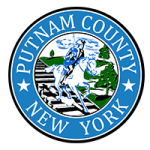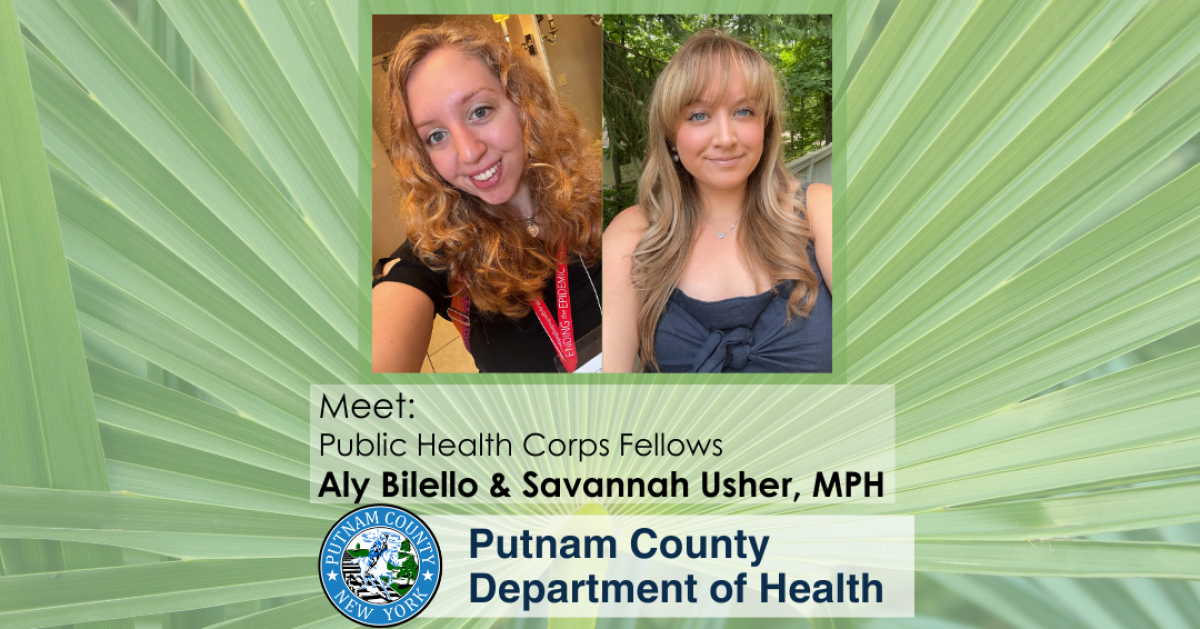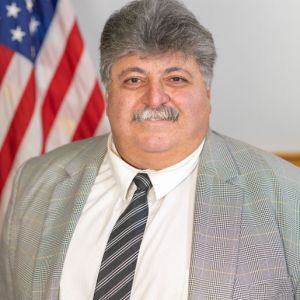
News & Press Releases
The Putnam County Department of Health is made of several divisions all working towards improving and protecting the health of the community. Click on one of the options below to learn more about that division.

Spotlight on the Public Health Corps Fellowship
The New York State Public Health Corps Fellowship was established in 2021 to assist local health departments in COVID-19 efforts. The Fellowship quickly transitioned into supporting local health departments in various programs and initiatives. The Putnam County Department of Health was allocated several Public Health Corps Fellows who worked in areas ranging from mental health, emergency preparedness, tobacco prevention and cessation, childhood immunizations, and many more. As the first cycle of the Fellowship draws to a close, we are spotlighting two of the remaining Fellows: Aly Bilello and Savannah Usher, MPH. Other Fellows who have moved on to different opportunities include Stacey Gussak, Irene Sakamoto, and Natalia Sanchez-Bahr. Continue reading to find out more about Aly and Savannah.
What is your favorite part of working at the health department?
Aly: My favorite part about working at PCDOH is being a direct part of the activities and processes that continue to have positive impacts on the health and wellbeing of our county. I especially love attending community events, health fairs, and engaging students with activities about substance use and mental health.
Savannah: That’s a tough one! There really are a lot of favorites here for me but since I have to choose, it would definitely be that the work we do here has a tangible impact on community health. Every day brings new challenges and the chances to collaborate with passionate professionals dedicated to improving health outcomes. That’s why I’m here.
Is there a particularly rewarding experience you’d like to share?
Aly: There’s a lot! I would say that implementing the hands-on ‘Escape the Vape’ activity in middle schools with our partners at the Prevention Council of Putnam has been amazing. Meeting so many people not only in the department, but county-wide who do amazing work for the people and families who live here. Engaging with community members and providing them with relevant information and resources that they may not have been previously aware of—that is a great feeling!
Savannah: Yes! One particularly rewarding experience was when we successfully implemented a data-driven initiative to reduce non-fatal and fatal overdoses in our community. By identifying the rates of overdoses, our coordinated efforts with local organizations allowed us to provide essential information to our communities and most importantly, services to those who needed them quickly and efficiently. Seeing the direct impact of our efforts, with lives saved and families supported, reaffirmed my commitment to this vital work.
What does your day-to-day work look like?
Aly: It’s different every day. One day I could be packing for an event, another day I’m attending a meeting with partners on strategies to reduce overdoses. The next week I could be presenting to students about neuroplasticity or attending a training about social interventions through my fellowship. That’s why I love it—there’s opportunity to do so much.
Savannah: Well, that depends, no two days are the same! From reviewing data and sharing trends (my fave), to creating social media posts for emergency preparedness best practices, refining public health strategies, working on reunification plans, educational materials or planning community outreach efforts; every day is different, and I think that’s what makes this job so exciting.
What do you wish the public knew about your job ?
Aly: Public Health is so broad—and that’s what makes it so awesome. Public health can be health education, harm reduction, disease surveillance, social justice, wellness, trauma-informed care, epidemiology, reproductive health. I could go on and on! Public Health as a field wears many hats, and I don’t think many people know that.
Savannah: Public health is all around us, often in ways we might not notice. It's about more than just responding to outbreaks; it's about preventing them. From clean water and safe food to vaccination programs and health education, public health efforts are vital to our everyday lives. The work we do is proactive and preventive, aiming to create healthier communities and reduce health disparities. Everyone benefits from strong public health systems, and community involvement and support are crucial for our success.
What’s the best piece of advice you’ve ever received?
Aly: Being patient and kind, not only to myself but to others. Speaking to others with dignity and respect, like you’d expect if someone spoke to you.
Savannah: The best piece of advice I received is: ‘Every day is a school day’; and that’s actually become my daily motto. This wisdom reminds me that there is always something new to learn, no matter how much experience I gain or how familiar a situation seems. It encourages me to approach each day with curiosity and openness, to seek out new knowledge, and to embrace the lessons that come from both successes and challenges. In public health, where the landscape is constantly evolving, this mindset helps me stay adaptable and proactive, ensuring that I can contribute effectively to the well-being of our community.
What have been some of the most important lessons you’ve learned throughout your career?
Aly: Some of the most important lessons I’ve learned so far is that not everything turns out the ways we think it will—and that’s okay! Being able to adapt and move forward with positivity, kindness, and enthusiasm to try something different is essential. Also, it sounds cliché, but stepping outside your comfort zone is a great way to learn something new. Public health is all about flexibility and adapting to what gets thrown your way, opportunities, or challenges.
Savannah: Adaptability is key. Public health is dynamic and constantly evolving with us. Being flexible and willing to pivot at the sight of new information and changing circumstances is crucial.
Collaboration is powerful. Working with diverse teams and community partners amplifies our impact. Public health isn’t just about the health department—we have to involve every stakeholder to provide equitable information and services.
Data-driven decisions matter! Accurate data collection and analysis are the backbone of effective public heath interventions. To be able to make informed decisions we need a strong evidence-based foundation and that’s what data does for us!
Fortunately for the health department, the Public Health Corps Fellowship is continuing into another cycle, and Aly and Savannah have agreed to stay in Putnam County. Later this summer, they will be joined by two more Fellows. They all have the opportunity to continue working (and learning) at the health department through 2026. To learn more about the NYS Public Health Corps Fellowship, please visit www.ny.gov/programs/new-york-state-public-health-corps.
Additional Articles
-
 New Community Health Survey Asks Residents: How Healthy Are We?
New Community Health Survey Asks Residents: How Healthy Are We? -
 Suicide Prevention in Putnam and Beyond
Suicide Prevention in Putnam and Beyond -
 Health Department Spotlight: Danny Reis
Health Department Spotlight: Danny Reis -
 Health Department Warns Residents About the Dangers of Lead Poisoning
Health Department Warns Residents About the Dangers of Lead Poisoning -
 Prevent mosquito breeding—dump standing water after rain
Prevent mosquito breeding—dump standing water after rain -
 Spotlight on the Public Health Corps Fellowship
Spotlight on the Public Health Corps Fellowship -
 The PCDOH Makes Summertime Living Easy…and Safe
The PCDOH Makes Summertime Living Easy…and Safe -
 Heat-Related Illnesses 101
Heat-Related Illnesses 101 -
 Tips for Staying Healthy During a Heat Alert
Tips for Staying Healthy During a Heat Alert -
 Free Rabies Vaccination Clinic Scheduled for July 13
Free Rabies Vaccination Clinic Scheduled for July 13
Welcome Message
The mission of the Putnam County Department of Health is to improve and protect the health of our community.
We strive to prevent the spread of disease, protect against environmental hazards, promote healthy lifestyles, ensure access to quality health services, and respond to disasters.
We encourage you to explore our website and contact us if you have any questions.
In the event of an emergency, Health Department staff are available 24/7. Please call 845-808-1390 to report a public health emergency, rabies exposure, communicable disease, water outage or sewer overflow.
If you are a member of the media and would like to contact the health department, please email
Contact the Department of Health
-
Office | 845.808.1390
-
Fax | 845.278.7921
-
Fax (Nursing) | 845.279.4104
-
Address | 1 Geneva Rd, Brewster, NY 10509
